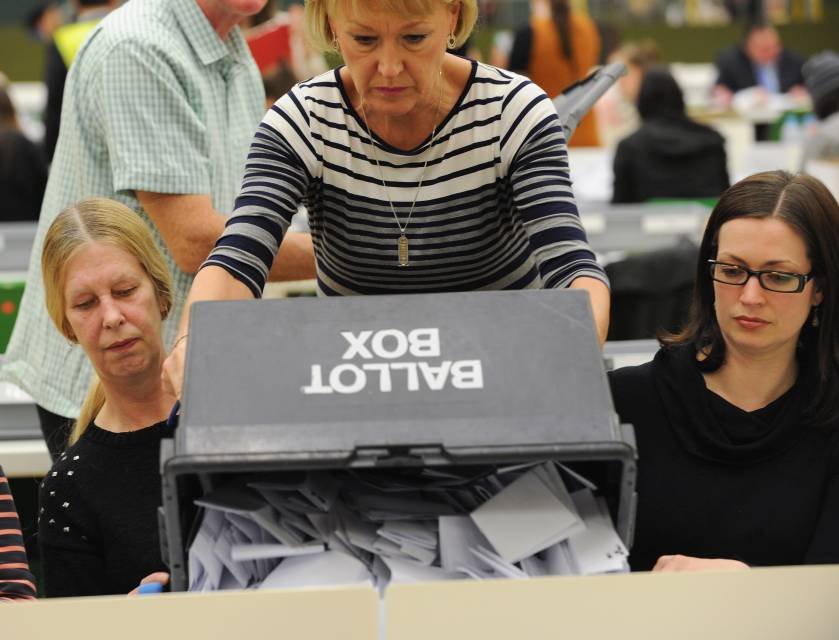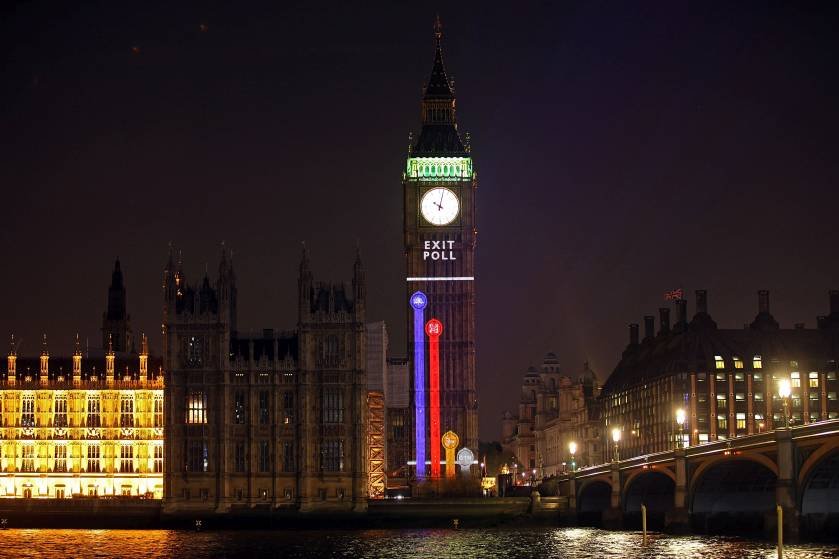The A-Z of the 2015 General Election night: What time do polling stations open, how to find your nearest one, and when results come out

If you're wondering what time the polling stations open, to how you can you find out which one they need to go to, to how long you'll have to stay up if you want to watch the results as they come out.
From absentee ballots to voters who choose "zero", here's our quick A-Z guide of everything you need to know about election night.
 bsentee ballot: The General Election only takes place once every five years, but what happens if you're sunning yourself on a beach, or away on a business trip? In such a scenario, the absentee ballot enables voters who can't present when the election occurs to submit their vote beforehand.
bsentee ballot: The General Election only takes place once every five years, but what happens if you're sunning yourself on a beach, or away on a business trip? In such a scenario, the absentee ballot enables voters who can't present when the election occurs to submit their vote beforehand.
 allot paper: The slip of paper you'll use to put an "X" next to the name of your chosen candidate when it's time to cast your vote on Thursday. If it has anything else written on it this will mean it's considered a spoiled vote and be rendered void.
allot paper: The slip of paper you'll use to put an "X" next to the name of your chosen candidate when it's time to cast your vote on Thursday. If it has anything else written on it this will mean it's considered a spoiled vote and be rendered void.
oalition: In the absence of a party with an outright majority one alternative is to form a coalition government between two or more parties. We've just had five years of coalition government thanks to a tie-up between the Conservatives and the Liberal Democrats. Nonetheless, it's previously been a rare occurrence – this was Britain's first coalition government since WW2 – and yet this election looks like it could be pretty similar.
Confidence and supply: If, for whatever reason, the political parties aren't able to form a coalition government, then "confidence and supply" is a step down from this. In such a scenario, the larger party will make a deal with a smaller party (or parties) to protect it from votes of no confidence as well as help it squeeze the Budget through. Nonetheless, so-called "confidence and supply" agreements are notoriously unstable – we haven't had here since as far back as 1977.
Constituency: Britain is carved up into 650 parliamentary constituencies, each of which will elect one member of parliament to the House of Commons on Thursday. According to the Office for National Statistics, the median number of people eligible to vote across constituencies are about 72,400 in England, 69,000 in Scotland, 66,800 in Northern Ireland and 56,800 in Wales.

The counting process begins after the polls close at 10pm (Source: Getty)
Counting process: Once polling stations close at 10pm, the police transport the sealed ballot boxes to counting centres across the country. Counting begins when the first batch of ballot boxes arrive and continues through to Friday morning.
eposit: Each of the candidates standing in this year's General Election had to pay a deposit of £500. This will be refunded, providing they get more than five per cent of the total votes valid in their constituency. This time Ukip is expected to be less out of out of pocket than five years ago, when its candidates lost a whooping £229,000.
lectoral register: This is an official list with all the names and addresses of people in an area who have the right to vote in the election. It's typically used for electoral purposes, such as making sure only eligible people can vote. Individual voter registration was introduced last year, replacing the previous system where one person in each household registered everyone to vote.
Exit poll: When a small percentage of voters are surveyed as they leave polling stations across the UK. They're typically commissioned by broadcasters and used to provide the first insight into the final result. The only exit poll will be released by the BBC, ITV and Sky News at 10pm. It's definitely worth a watch – it managed to successfully predict the outcome of the 2005 and 2010 General Elections.
irst past the post (FPTP): Under FPTP each constituency votes to elect a single MP to the House of Commons. To score a win under FPTP, a political party must win over half the UK's seats (326 out of 650). This would give them a parliamentary majority, providing them with the support needed to pass legislation, and ultimately govern. Unlikely in this election.
rand coalition: This would involve a European-style tie-up between the two main parties, Labour and the Conservatives. Britain has only ever had three grand coalitions – two during world wars, and the other in the aftermath of the Wall Street Crash of 1929. Commentators have voiced scepticism over such an eventuality, while the idea has been rejected by both Labour and the Tories.
ung parliament: If no party wins an overall majority – something which is looking increasingly likely – they will be unable to pass laws in the House of Commons without support from another political party. Consequently, the parties will start negotiations to determine the next government – during this time the current coalition government remains in charge.

Hung parliaments tend to lead to awkward moments in rose gardens… (Source: Getty)
nter-party negotiations: This is what happens if no party manages to win an overall majority. Last time, the talks that resulted in a coalition between the Conservatives and Liberal Democrats lasted five days. However, there isn't deadline is set for the negotiations.

ournalists: Who's backing who? The Guardian, Mirror and the New Statesman are backing Labour. The Sun (with the exception of its Scottish edition, which has gone for the SNP) and the Telegraph are behind the Tories. While the Financial Times, Economist magazine, the Times and the Independent have come out in favour of another coalition.
ampstead and Kilburn: This north London constituency is the most marginal seat in Britain, with a majority of just 42. This time round, Labour's Tulip Siddiq is going up against Tory candidate Simon Marcus, as well as former Islamist turned counter-extremist Maajid Nawaz from the Liberal Democrats.
andslide: While there's no official definition, "landslide" refers to a situation in which a political party wins a lot more seats than its nearest rival. The polls are showing that this is extremely unlikely to happen in terms of the general outcome. Nonetheless, the SNP could secure a landslide victory in Scotland.
arginal seats: Marginal seats are those in which the vote could go either way, and consequently it's been said that they can decide the election. Some closely-watched ones include South Thanet, where Nigel Farage is standing as well as Britain's most marginal seat Hampstead and Kilburn (see "H").

Sunny Hampstead is the UK's most marginal seat (Source: Getty)
otional result: Notional results are calculated from how people actually voted in 2005, but divided up between the new boundaries – not how they would have voted had the new boundaries really been in use.
 pinion polls: Opinion polls are one way to keep track of how a sample of the population say they plan to vote on Thursday. The companies which produce them generally assume a margin of error of about three per cent from a sample of 1,000 people.
pinion polls: Opinion polls are one way to keep track of how a sample of the population say they plan to vote on Thursday. The companies which produce them generally assume a margin of error of about three per cent from a sample of 1,000 people.
 olling clerk: A staff member in the polling station charged with checking the electoral register to verify that a person is eligible to cast his vote and at that particular polling station.
olling clerk: A staff member in the polling station charged with checking the electoral register to verify that a person is eligible to cast his vote and at that particular polling station.
Polling station: These will be open between 7am and 10pm for anyone aged 18 and over who is registered to vote in person. Councils should have sent individuals their poll card just before the election telling them where and when to vote. Find your closest one by entering your postcode on this website.
Postal vote: Postal voters get their ballot paper the week before and must return it by 10pm on election day.
ueen: Whether a prospective government has enough support in the House of Commons to govern is tested by a vote on the Queen's speech. It takes place at the start of parliament, and sets out the legislative agenda prepared by the prospective government, which the Queen reads out. It's due to take place on the 27th May.
ecount: If, after election night, the results are in and for some constituencies it's a very close call, candidates standing there can ask for a recount – and for reasonable additional recounts after this.
afe seat: This is a parliamentary seat that looks like it's sure to be held by the same party as held it before.
Second election: Britain could go to the polls again if the government formed after 7 May collapses. This could occur in two incidences: firstly, a vote to dissolve parliament which is supported by two-thirds of the House of Commons – or a vote of no confidence in the current government.

Polling stations close at 10pm: in 2010, an exit poll was projected on Big Ben as soon as voting closed (Source: Getty)
ellers: Tellers are usually affiliated with a political party, and stand outside polling stations to collect electoral registration numbers off of voters as they enter and leave. They're not officially part of the election, and people aren't obliged to speak to them. However, it's a way for parties to identify who's voted and perhaps drum up some additional votes on the day.
Timings: Polling stations open at 7am and close at 10pm.
npredictable: It's been said over and over again, but this election is perhaps the most unpredictable in living memory, thanks to the migration of support from the main parties such as Labour and the Tories to smaller parties like UKIP and the Greens.
oters: The majority of UK, Commonwealth and Irish citizens with residency in the UK who are aged 18 and over have the right to vote. But prisoners and anyone who has been found guilty of electoral misconduct in the last five years cannot vote.
in: This implies either a gain where a political party wins a constituency that it did not previously hold or a hold where a political party manages to hang onto a constituency that it already held.
tremely long: It's going to be an eXtremely long night for anyone staying up to watch the results. People should watch out for an exit poll, due at 10pm. The first result is will be declared at 11pm – Houghton and Sunderland South – and the last is St Ives, at 1pm the next day.
, Generation: One report has suggested that the uncertainty surrounding the general election mean Generation Y – or those born after 1980 – now holds more electoral power than it did before. What's more, they're blurring traditional left-right policy divisions by favouring sometimes-conflicting policies, and they care about issues such as high unemployment rates and rising house prices.
ero: Some people are so unimpressed with the policies on offer that they've decided to refrain from voting. And others believe that their vote won't really count. One of these is economist Ryan Bourne who recently wrote in City A.M. "I’ve decided after long and careful thought to abstain".
[custom id="1"]




















